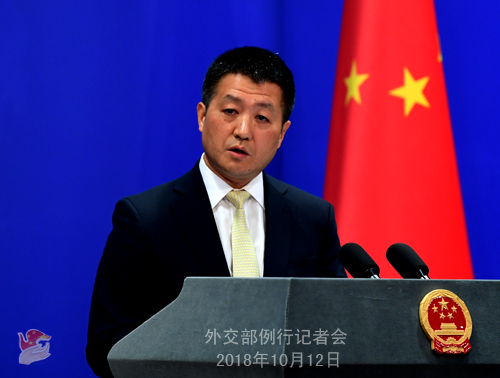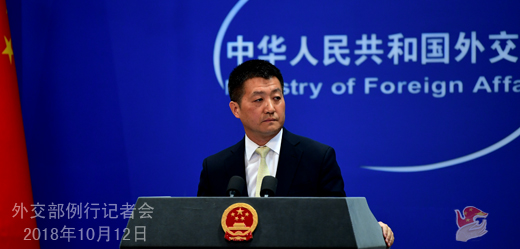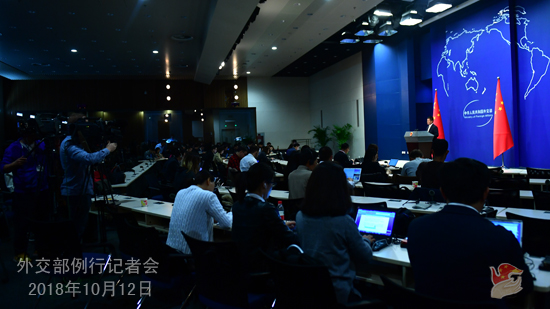| Foreign Ministry Spokesperson Lu Kang's Regular Press Conference on October 12, 2018 |
| 2018-10-12 21:18 |
|
At the invitation of Premier Li Keqiang, Japanese Prime Minister Shinzo Abe will pay an official visit to China from October 25 to 27. Q: You just announced that Japanese Prime Minister Shinzo Abe will be visiting China. Do you have more details? And how does China look at the China-Japan relations at this point? What are China's expectations for this visit? A: Japan is an important neighbour for China. With the concerted efforts of the two sides, the momentum for improving China-Japan relations continues to be strengthened. This trip is the first official visit to China by a Japanese Prime Minister in seven years at a crucial juncture marking the 40th anniversary of the signing of the China-Japan Treaty of Peace and Friendship. During the visit, Chinese leaders will hold meetings and talks with Prime Minister Shinzo Abe to exchange views on the improvement and development of China-Japan relations and international and regional issues of mutual interest. As far as I know, the two sides will also host a reception commemorating the 40th anniversary of the inking of the China-Japan Treaty of Peace and Friendship and the First China-Japan Third-Market Cooperation Forum. You may have also noticed that high-level interactions and across-the-board exchanges between China and Japan have become more frequent recently. On China's part, we attach importance to China-Japan relations. To ensure the sustained, sound and steady development of our bilateral relations, the two sides need to follow the principles and spirit of the four political documents between China and Japan, confirm that we're cooperation partners and pose no threats to each other, and support each other's peaceful development. The two sides should build on the past achievements to pursue new progress and consolidate the political and legal foundation for the development of China-Japan relations. Besides, China and Japan are two major economies in the world. When we deepen economic and trade cooperation, not only the interests of the two sides but also the development of global economy and trade stand to benefit. We hope the two sides will leverage complementary strengths, continuously expand cooperation in trade and investment, economy and finance, and innovation and high-tech fields, jointly explore third-party markets, uphold multilateralism and free trading system, and safeguard an open world economy. We are always open to more investments from Japanese enterprises. We hope that Prime Minister Shinzo Abe's visit will help the two countries enhance political mutual trust, deepen practical exchange and cooperation across the board and contribute to bringing the China-Japan relations back to the right track for greater progress. Q: A US cyber security firm recently issued a report, saying that in the first six months of this year, China has intensified its efforts to steal commercial secrets from the US and has become the biggest state sponsor of cyber-attacks against the West. What's your comment? A: We have taken a lot of similar questions recently. These accusations are baseless. Some people in the US have been exploiting specious rumors to slander and frame China. I want to reiterate that China is one of the main victims of cyber espionage and attacks, but we are also a staunch champion of cyber security. China consistently opposes and combats all forms of cyber espionage and attacks. Some companies and individuals in the US revealed their ulterior motives by using the so-called "cyber espionage" issue to level groundless accusations on China. Considering the materials revealed by Edward Snowden and others, the international community must have already known who have long been engaging in large-scale surveillance on foreign governments, companies and individuals and who have conducted the largest-scale cyber attacks. We urge the US to stop hyping up the "cyber espionage" issue to discredit China and stop undermining China's interests and China-US relations. Q: There have been reports suggesting that President Trump and President Xi Jinping will meet at the G20 Summit in November. I am wondering if China is willing to see a summit between the two leaders even as the US leader has said that he is ready to take a lot more actions against China? A: I have noted relevant reports. China and the US keep in contact with each other on dialogues and exchanges at all levels.
Q: The US leader said the other day that China has taken a sharp "U-turn" in recent years on freedom and human rights. What is your comment? A: The Chinese government always attaches high importance to promoting and protecting human rights, and Chinese citizens enjoy a broad range of rights and freedom in accordance with law. China's human rights cause has realized historic progress over the past four decades of reform and opening-up. We have lifted more than 700 million people out of poverty and offered jobs to 770 million people. Nearly 800 million netizens in China exercise their supervisory right through online platforms on governments at all levels. China has nearly 200 million believers, more than 380,000 clerical personnel, and 140,000 places of worship registered for religious activities. These figures honestly reflect the truth that Chinese people have rights and freedom. When it comes to human rights, no country can claim to have the best record. It is always a work in progress. China will remain committed to following a path of human rights development that suits China's national conditions, promoting and protecting human rights through pursuing development, and striving for a coordinated development of economic, social and cultural rights and civil and political rights. It must be pointed out that no country has absolute and boundless human rights freedom. Everyone needs to observe the Constitution and other laws while enjoying human rights freedom. No one should be allowed to engage in criminal activities behind the veneer of human rights freedom. The US has been engulfed by one human rights issue after another. It also withdrew from the relevant UN human rights agency. It has no right to point fingers at other countries. Our advice for the US is to reflect upon its immense violations of human rights, instead of utilizing human rights issues as political tools to interfere in other country's internal affairs. Q: According to reports, the Five Eye Alliance-grouping intelligence agencies from the US, Australia, Britain, Canada and New Zealand-has been sharing information with other countries including Germany, Japan and France in an effort to counter China. I am wondering if you have seen the report and if you have comments on that? A: I have noted relevant reports. China is committed to the path of peaceful development and a strategy of opening-up featuring mutual benefit and win-win cooperation. We seek to develop friendly cooperation with others on the basis of the Five Principles of Peaceful Co-existence and build a community with a shared future for mankind. China will always be an architect for world peace, a contributor to global development and a guardian of international order. China's economic and diplomatic activities around the world are generally welcomed by all. The current international landscape is filled of uncertainties and destabilizing factors. Unilateralism and protectionism are surging. We hope that all parties could discard the outdated Cold War mindset and zero-sum game, view China and China's development in an objective, correct and rational way, show more openness, inclusiveness and cooperation, and have less narrow-minded speculations and ideological prejudices, let alone attempt to create exclusive small clubs. All parties should invest more time and efforts in enhancing mutual trust and promoting world peace, stability and prosperity, instead of doing the opposite.
|
 |
|


